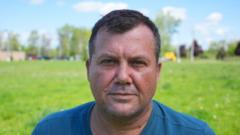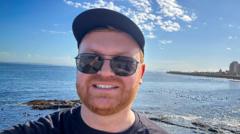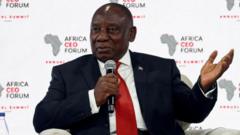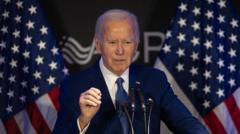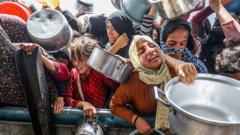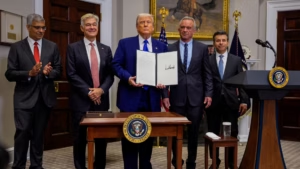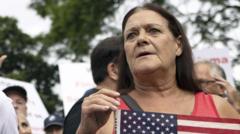President Trump's assertion that white South Africans face genocide has ignited debates, with the South African government refuting such claims. A closer look at the historical context of Afrikaners, recent violence statistics, and societal reactions provides insight into the truth behind these allegations.
Examining the Claims of Genocide Against White South Africans

Examining the Claims of Genocide Against White South Africans
The controversial statement by Donald Trump regarding the alleged genocide against Afrikaners in South Africa raises questions as political and social discourse unfolds.
In recent discussions surrounding the allegation of a genocide against white South Africans, former U.S. President Donald Trump has granted refugee status to some members of the Afrikaner community, asserting that they are fleeing a dangerous environment in South Africa. The arrival of nearly 60 Afrikaners in the United States, following their asylum applications, starkly contrasts with traditional depictions of refugees. They were allowed to board a chartered flight from Johannesburg, a detail that raises eyebrows about the actual persecution they claim to be escaping.
The Afrikaners, primarily descendants of Dutch, German, and French settlers, form a cultural group deeply rooted in South Africa. The group's history is marred by its role in enforcing apartheid from 1948 until the end of institutionalized racial segregation in 1994. While Trump claims that a genocide is occurring against this community, no political party in South Africa, including those representing Afrikaners, has substantiated this alarming assertion.
Many discussions have erupted from right-wing circles, suggesting that criminal violence, particularly farm attacks, indicates systemic targeting of white farmers. However, key statistics tell a different story. In the last quarter of 2024, South Africa reported a staggering 6,953 total murders, with only a small fraction—merely 12—resulting from farm-related incidents. The country’s police service director emphasized this term—genocide—as exaggerated and unfounded.
South African President Cyril Ramaphosa has unequivocally dismissed Trump's characterization, calling it 'completely false.' In his view, the movement of Afrikaners to the U.S. reflects a resistance to the evolving socio-political landscape, rather than experiencing targeted persecution. Conversely, discussions around land reform policies, which aim to address past injustices faced by black South Africans during apartheid, have sparked debates about property rights and economic justice.
Elon Musk, who grew up in South Africa, has also fueled the fire of these claims, pointing toward his own business struggles rooted in current ownership laws intended to rectify historical economic inequities. Additionally, lyrics from political leader Julius Malema's song, "Shoot the Boer," have drawn contrast, illustrating a cultural schism between the past and present political landscapes. Although characterized as provocative, the South African Supreme Court upholds the right to perform such culturally significant songs as part of political expression.
Despite Trump's allure for Afrikaners, a recent poll showed that a mere percentage of the 2.5 million Afrikaners in South Africa are considering relocation to the U.S. The U.S. embassy clarified that the program applies to all racial minorities citing past or future persecution fears, not just Afrikaners. Although interest seems piqued, many leaders within the Afrikaner community express a commitment to build their futures in Africa rather than seek shelter abroad.
The intricate dynamics surrounding these claims require continued investigation and dialogue, particularly given the historical injustices faced in South Africa. As discussions continue, it remains essential to distinguish between fact and politically motivated rhetoric in the evolving narrative surrounding race, identity, and asylum.
The Afrikaners, primarily descendants of Dutch, German, and French settlers, form a cultural group deeply rooted in South Africa. The group's history is marred by its role in enforcing apartheid from 1948 until the end of institutionalized racial segregation in 1994. While Trump claims that a genocide is occurring against this community, no political party in South Africa, including those representing Afrikaners, has substantiated this alarming assertion.
Many discussions have erupted from right-wing circles, suggesting that criminal violence, particularly farm attacks, indicates systemic targeting of white farmers. However, key statistics tell a different story. In the last quarter of 2024, South Africa reported a staggering 6,953 total murders, with only a small fraction—merely 12—resulting from farm-related incidents. The country’s police service director emphasized this term—genocide—as exaggerated and unfounded.
South African President Cyril Ramaphosa has unequivocally dismissed Trump's characterization, calling it 'completely false.' In his view, the movement of Afrikaners to the U.S. reflects a resistance to the evolving socio-political landscape, rather than experiencing targeted persecution. Conversely, discussions around land reform policies, which aim to address past injustices faced by black South Africans during apartheid, have sparked debates about property rights and economic justice.
Elon Musk, who grew up in South Africa, has also fueled the fire of these claims, pointing toward his own business struggles rooted in current ownership laws intended to rectify historical economic inequities. Additionally, lyrics from political leader Julius Malema's song, "Shoot the Boer," have drawn contrast, illustrating a cultural schism between the past and present political landscapes. Although characterized as provocative, the South African Supreme Court upholds the right to perform such culturally significant songs as part of political expression.
Despite Trump's allure for Afrikaners, a recent poll showed that a mere percentage of the 2.5 million Afrikaners in South Africa are considering relocation to the U.S. The U.S. embassy clarified that the program applies to all racial minorities citing past or future persecution fears, not just Afrikaners. Although interest seems piqued, many leaders within the Afrikaner community express a commitment to build their futures in Africa rather than seek shelter abroad.
The intricate dynamics surrounding these claims require continued investigation and dialogue, particularly given the historical injustices faced in South Africa. As discussions continue, it remains essential to distinguish between fact and politically motivated rhetoric in the evolving narrative surrounding race, identity, and asylum.

